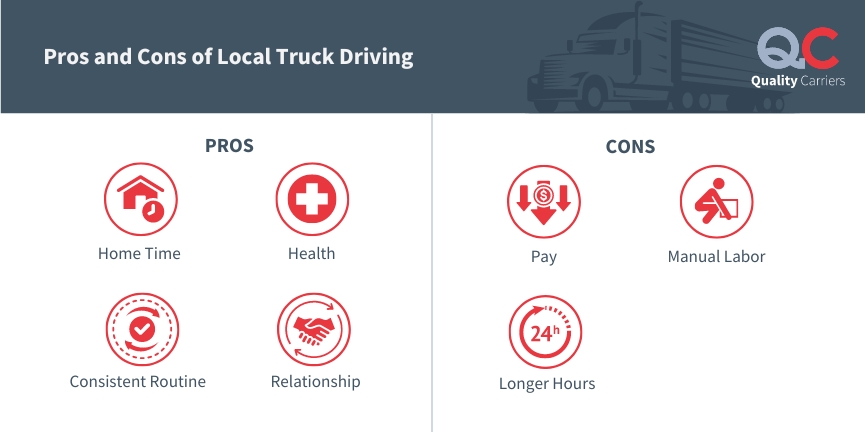Truck driving isn’t just a job—it’s a diverse and dynamic profession offering various career paths to suit different lifestyles and preferences. From regional routes to local deliveries and long-haul journeys, trucking offers drivers multiple opportunities, each with unique pros and cons. In this guide, we’ll explore the key differences between regional, local, and over-the-road (OTR) truck driving to help aspiring truckers make informed decisions about their career paths.
What is Regional Truck Driving?
Regional truck driving involves transporting freight within a specific geographic region, typically covering multiple states or a particular area of the country. This type of driving balances the long-haul nature of OTR driving and the local routes of city driving. Regional drivers are often able to return home on a more frequent basis compared to OTR drivers, making it a suitable option for those who value regular home time.
Pros of Regional Truck Driving
- Home time: Regional drivers enjoy more predictable schedules and regular home time than OTR drivers, allowing for greater work-life balance.
- Travel: Despite operating within a designated region, regional drivers experience diverse landscapes and destinations during their routes.
- Relationship: Building relationships with regular customers and becoming familiar with specific routes can provide a sense of community and familiarity on the road.
- Bonus Options: Some regional trucking companies offer bonuses or incentives for drivers who consistently meet performance goals, providing an opportunity for additional earnings.
Cons of Regional Truck Driving
- Strict Deadlines: Regional driving often involves tight delivery schedules and deadlines, requiring drivers to manage their time and adhere to strict timelines efficiently.
What is Local Truck Driving?
Local truck driving involves transporting goods within a localized area, such as a city or metropolitan region. Unlike regional or OTR driving, local drivers typically return home every day after completing their shifts. This type of driving offers a consistent routine and greater proximity to home but may involve more manual labor and limited earning potential compared to other types of truck driving.

Pros of Local Truck Driving
- Home time: Local drivers enjoy returning home daily, which allows them to spend more time with family and friends and achieve a better work-life balance.
- Health: The consistent schedule of local driving can contribute to better physical health by minimizing the challenges associated with irregular sleep patterns and long hours on the road.
- Consistent Routine: Local routes often follow a predictable schedule and familiar routes, providing drivers with stability and routine.
- Relationship: Local drivers can establish relationships with regular customers and become familiar with specific delivery locations, fostering a sense of community and connection.
Cons of Local Truck Driving
- Pay: Local driving may offer lower earning potential than regional or OTR driving, as drivers are typically paid based on hourly wages or shorter-distance routes.
- Manual Labor: Local drivers may be required to engage in more manual labor, such as loading and unloading cargo, compared to other types of truck driving.
- Longer Hours: While local driving offers the benefit of returning home daily, drivers may still work long hours, especially during peak delivery times or when facing traffic congestion in urban areas.

What is OTR Truck Driving?
Over-the-road (OTR) truck driving involves long-haul freight transportation across vast distances, often spanning multiple states or regions. OTR drivers operate over extended periods, spending days or weeks on the road before returning home. This type of driving offers higher earning potential and a sense of independence but may involve extended periods away from home and greater challenges in maintaining a healthy lifestyle.
Pros of OTR Truck Driving
- Highest Pay: OTR drivers typically earn higher salaries than regional or local drivers, as they are compensated for the long distances and extended periods spent on the road.
- Travel: OTR driving allows one to explore diverse landscapes and destinations across the country, offering a sense of adventure and discovery.
- Independence: OTR drivers have greater autonomy and flexibility in managing their schedules and routes, allowing them to exercise greater independence and control over their work.
Cons of OTR Truck Driving
- Home Time: OTR drivers spend extended periods away from home, often for several days or weeks at a time, which can lead to isolation and homesickness.
- Lonesome: The solitary nature of OTR driving can be mentally and emotionally challenging for some drivers, particularly those who thrive on social interaction and companionship.
- Health: OTR drivers face challenges in maintaining a healthy lifestyle due to irregular schedules, limited access to nutritious meals, and the passive nature of long hours behind the wheel.
Regional vs. Local vs. OTR Truck Driving
Requirements
- Regional truck driving often requires a commercial driver’s license (CDL) and may have specific endorsements depending on the type of cargo being transported.
- Local truck driving typically requires a CDL and may involve additional certifications or training, such as endorsement of hazardous materials (HazMat).
- OTR truck driving generally requires a CDL and may involve more extensive training due to the long-distance nature of the job.
Salary
- Regional truck drivers may earn salaries that fall between local and OTR drivers, depending on experience, company, and specific job requirements.
- Local truck drivers may have lower starting salaries compared to regional and OTR drivers but often benefit from more predictable schedules and home time.
- OTR truck drivers typically earn higher wages due to the longer distances traveled and extended time away from home.
Cargo Type
- Regional truck drivers may transport a variety of cargo types within a specific geographic area or region, ranging from consumer goods to industrial materials.
- Local truck drivers often handle local deliveries and may transport goods such as groceries, construction materials, or parcels.
- OTR truck drivers commonly transport goods over long distances, including perishable items, automotive parts, electronics, and more.
Routes
- Regional truck drivers typically operate within a designated region or area, covering routes that span several states or a specific geographic territory.
- Local truck drivers usually work within a local area or city, making frequent stops for deliveries or pickups within a smaller radius.
- OTR truck drivers travel long distances, often traversing multiple states or crossing the country on extended hauls.
Career Advancement
- Regional truck driving can offer opportunities for advancement within a company, such as moving into management roles or transitioning to specialized divisions.
- Local truck drivers may have opportunities to advance within their companies or transition to regional or OTR positions as they gain experience.
- OTR truck drivers may advance to become trainers, fleet managers, and owner-operators or pursue specialized niches within the trucking industry, such as transporting hazardous materials or oversized load hauling.
Start Your Truck Driving Career at Quality Carriers
Are you ready to hit the road and kick-start your truck driving career? Look no further than Quality Carriers, where opportunities abound for drivers seeking rewarding and fulfilling careers in the transportation industry. With a commitment to safety, excellence, and professional growth, Quality Carriers offer a supportive environment for drivers to thrive and succeed. Begin your journey today towards a successful, rewarding truck driving career.
In conclusion, the choice between regional, local, and OTR truck driving ultimately depends on individual preferences, priorities, and lifestyle considerations. Each type of driving offers unique benefits and challenges, and drivers should carefully weigh their options to determine which aligns best with their needs and goals. Whether seeking regular home time, higher earning potential, or a sense of adventure on the open road, there is a truck driving opportunity suited to every driver.
Find out what type of truck driving you want to start!
FAQs
What are the typical routes for regional, local, and OTR truck drivers?
Typical routes for regional truck drivers often involve driving within a specific geographic area or region, such as a few states or a particular part of the country. Local truck drivers typically operate within a smaller radius, often within a city or metropolitan area. OTR (Over-the-Road) truck drivers travel long distances, usually across multiple states or the country.
How does pay differ for regional, local, and OTR truck driving positions?
Pay for regional, local, and OTR truck driving positions can vary significantly. OTR drivers generally earn the highest pay due to the long distances and extended time away from home. Regional drivers typically earn a moderate salary, balancing decent pay with more predictable home-time schedules. Local drivers may have lower pay rates than regional and OTR drivers but often benefit from more consistent schedules and daily home time.
What equipment is commonly used in regional, local, and OTR truck driving?
The type of equipment used in regional, local, and OTR truck driving is mainly similar, consisting of semi-trucks or tractor-trailers. These vehicles vary in size and configuration but typically include a cab for the driver and a trailer for cargo. However, OTR drivers may use larger sleeper cabs equipped with sleeping quarters for extended trips, while regional and local drivers often use day cabs designed for shorter hauls and frequent stops.









